Author: Emma Bradstock
Samsung’s foldable phones have nicely slipped into its yearly phone releases, with the Galaxy Z Flip4 and the Galazy Z Fold4 launching late this year. While there are incremental improvements from the Galaxy Z Flip4’s 2021 predecessor, it’s a phone that feels less gimmicky and leans more into the advantage of having a compact phone that folds in half. It’s also a phone with a hefty price tag, and while foldable technology has its complications that are different to a standard phone, the ultimate selling point is its compact nature.
The Samsung Galaxy Z Fip4 carries many of the features you would expect of a phone for this price, and while it delivers a good performance overall, some users might not find the foldable tech enough to justify the expense. Read our hands-on review to find out more.
How we tested the Samsung Galaxy Z Flip4
I used the Samsung Galaxy Z Flip4 over the course of several weeks across a range of functions, from web and social browsing to gaming and video streaming. In addition to testing and benchmarking battery and charging performance, I also tested the benefits that having a compact flip phone can bring.
Samsung Galaxy Z Flip4 features and specs
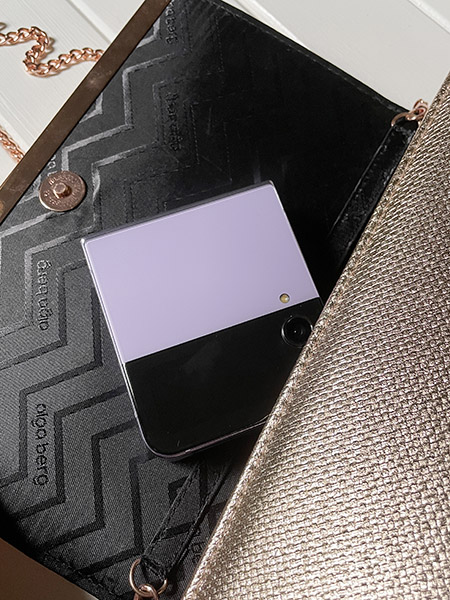
- $1699 rrp (128GB); $1849 rrp (256GB), $2049 rrp (512GB)
- 6.7-inch FHD+ Dynamic AMOLED 2X Infinity Flex display main screen
- 1.9-inch Super AMOLED display on cover
- Qualcomm SM8475 Octa core processor
- Dual rear camera setup (12MP ultra-wide + 12MP wide)
- 10MP front-facing camera
- 3700mAh battery, 25W fast charging, 15W fast wireless charging, Power Share
- Side fingerprint sensor and facial recognition
- Android 12 operating system
- IPX8 water and dust resistance
- 5G connectivity
- 8GB RAM
- 128GB, 256GB and 512GB storage sizes
- Bora Purple, Graphite, Pink Gold and Blue colourways (option to customise colours through the Samsung store)
| Samsung Galaxy Z Flip4 pros | Samsung Galaxy Z Flip4 cons |
|---|---|
|
|
Design and functionality
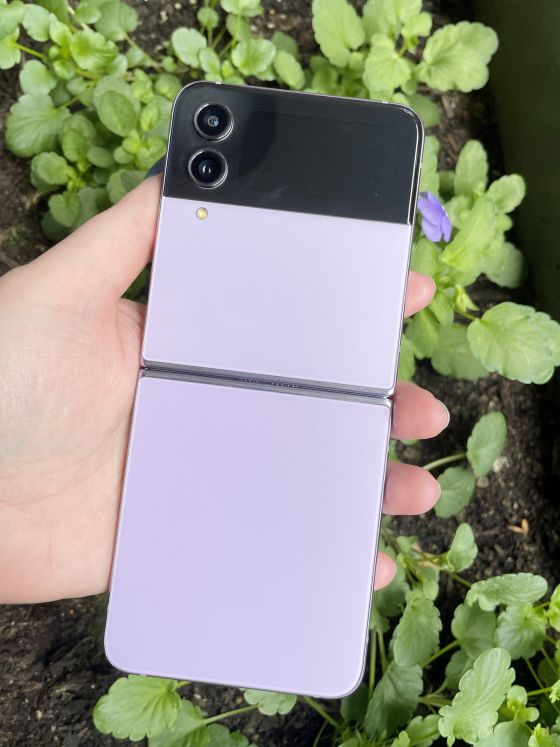
- Nice matte finish on back with rather scratch-proof coating
- Opening the phone difficult to do one-handed if you have small hands
The big drawcard for the Samsung Galaxy Z Flip4 is, of course, its foldable design. The more compact and pocket-friendly Flip4 is like a traditional flip phone, and it gives the same vibe as those flip phones back in the day. There’s the choice between four main colours — Bora Purple, Pink Gold, Blue or Graphite — along with the option to create a bespoke design via the Samsung website, with a selection of colours to mix-and-match for the top and bottom sections and the casing/hinge.
I also feel that this is one of the few phones where it doesn’t need a case, as the back of the phone feels durable and the matte finish seems rather smudge and scratch-proof. The back of the phone uses Corning Gorilla Glass Victus+ for both the cover screen and back of the device, with a hinge made from Samsung’s tough aluminium frame, Armour Aluminium.
When closed, the Galaxy Z Flip4 measures around 4 inches diagonally (just over 80mm high by 70mm wide) and features a 1.9-inch display next to the rear cameras. The phone flips out to show a 6.7 inch FHD+ Dynamic AMOLED 2X Infinity Flex display. The phone feels rather long when folded out – it has a similar width to the iPhone 14, but feels like a longer phone than others at this size without a more proportional width.
Samsung’s marketing for the Z Flip4 is focused around women and marketing the phone as a fashion accessory. Given the compact size of the phone, I can see that it could fit easier in a small handbag or the teeny tiny pockets women’s clothes come with (if there are pockets at all). But, when it’s folded you do get extra thickness, so I’m still unsure about whether it really is as compact as it’s promoted to be.
The fold in the phone’s screen is still rather noticeable, and I found it was something my eye was drawn to when I first started using it. Although I felt like I had started getting used to it, it was noticeable when watching some videos — especially with a lot of darkness. This could be a deterrent for people who like to watch a lot of videos on their phone.
Using the phone
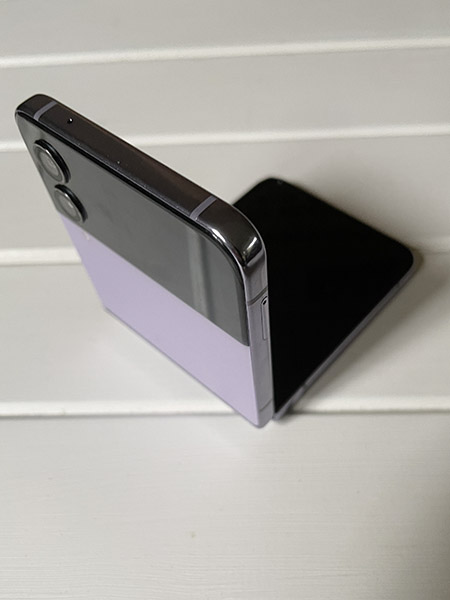
Unlike those old flip phones, I find that the Flip4 isn’t a phone I can easily open or close one-handed (like I could with my old Motorola Razr), which kind of takes some of the fun away. Instead, it’s a very slow closing motion and an awkward-looking opening motion (requiring a bit of repositioning of the phone and my fingers). I’ll blame having smaller hands, shorter fingers and poor grip strength for my struggles and stick to using both hands to open and close the phone.
That being said, because it’s a foldy phone and the back is a pretty purple colour, I was more inclined to keep the phone closed than I was to leave it open, even when I had it placed on a table or next to me at my desk.
The fingerprint scanner is built into the side-mounted lock button, and I found the positioning to be a bit too high for me to easily reach with my thumb. Samsung doesn’t really have an option as to where the buttons are placed because of the hinge, so I’ll give them a pass on this. The only alternative would be an in-screen fingerprint scanner, if the technology allows for it down the track. But this is also me being nit-picky based on how I use the phone, while others might not have the same issue.
Alternatively, you can also use facial recognition unlocking, but I found this to be a let down. Where fingerprint reading is fast and seamless, for some reason, the Flip4 didn’t recognise my face a lot of the time (and you get a ‘face doesn’t match’ error message to tell you). This was a frequent enough occurrence to be irritating, and after several failed attempts, you get locked out for around 30 seconds until you can try again. Even with different positioning, it still struggled at times to recognise my face, so I actually registered an ‘alternative appearance’ scan so it would recognise a different angle, which sort of helped. With such a glitchy experience, I would steer clear of relying solely on facial recognition for unlocking and stick to PIN/code/fingerprint.
Overall, the Samsung Galaxy Z Flip4 is a phone that looks good and functions as you would expect of a Samsung phone at this price point. While there are some obvious advantages to the size of the phone, it’s still not the most easy to use phone one-handed if you have smaller hands. However, it’s rather comfortable to hold and the folded size is certainly a plus for compact convenience.
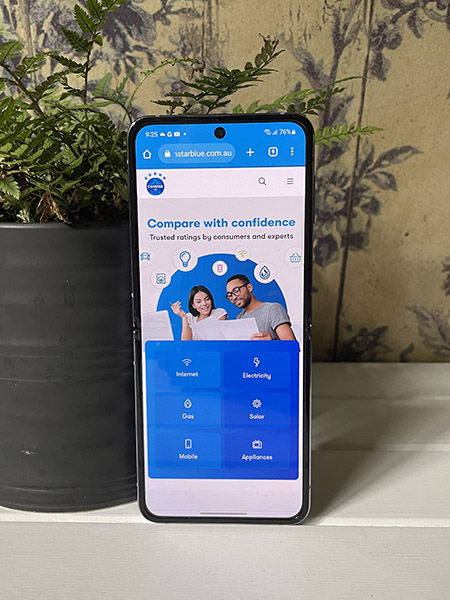
Performance
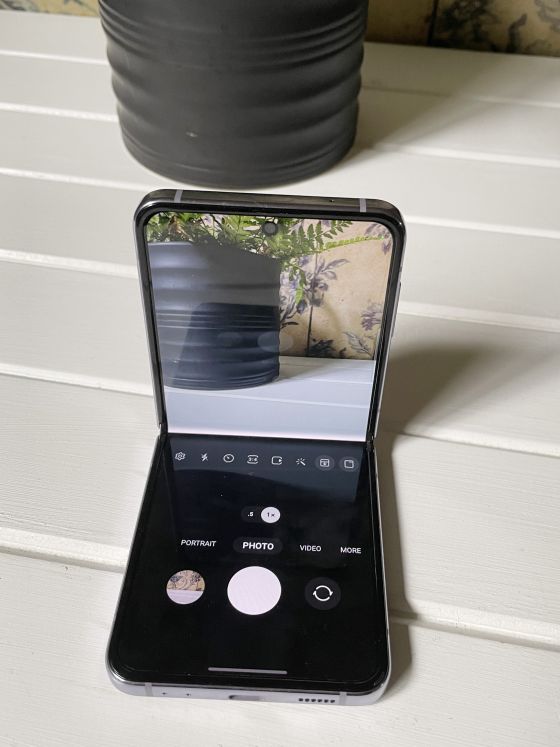
- Gorgeous screen and clever use of the mini display
- Battery performance fairly average
The Samsung Galaxy Z Flip4 doesn’t come cheap, and while much of that price tag is taken up by the foldable screen, you’d still expect a decent performance for a smartphone costing well over $1000. Samsung has packed in a Qualcomm SM8475 Octa core processor, 120Hz refresh rate, along with 8GB of RAM, 5G connectivity and 3700mAh battery with 25W fast charging compatibility.
The Galaxy Z Flip4 does provide an overall fast and zippy performance thanks to the processor, and a nice fluid experience — especially noticeable when scrolling through social media — with that 120Hz refresh rate. It provides the sort of smooth and seamless performance you would expect from a phone at this price.
There were a few instances of apps freezing and some unresponsiveness to lighter touch (for some reason, it seems to respond more to using your thumb on the screen than another finger). I also found that the device ran rather hot during some activities — such as gaming, heavy web or social browsing, and even when running internet speed tests — which was mostly noticeable in the mini screen on the back of the phone. However, overall I wasn’t particularly disappointed or frustrated with its general performance and it handled everything as you’d expect for a premium phone.
The stand out feature is how Samsung has utilised the mini screen when you have your phone closed. You can access widgets such as your calendar and weather, along with checking the time, battery life, when the phone is charging (and it tells you how long until it’s fully charged) and notifications such as messages and calendar events. You can also keep the screen design simple with an image or choose a moving image for personalisation. Ultimately, the screen isn’t useless, and since I tended to keep the phone closed most of the time, I found I did use the mini screen a fair bit. It’s a useful piece of technology that helps to make the phone’s folding capability more than just a gimmick.
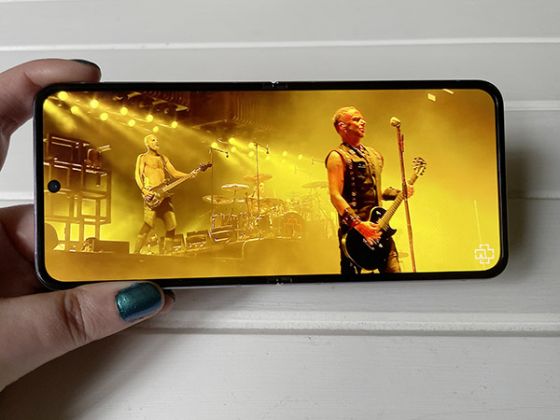
Viewing experience
On first impression, I was surprised by how long the phone felt, and found it to be a little too long to comfortably hold in one hand to watch videos in landscape view. However, I did get used to the size and feel of the phone, and even found the length really suited the screen ratio of some movies. The built-in speakers produce a quality sound performance for both movies/shows and music, although a little bit of a bass boost wouldn’t go amiss.
The screen is clear and vibrant, and certainly does feel premium (bar the visible fold line). However, I found the adaptive brightness wasn’t quite as intuitive as I would expect. On several occasions I needed to adjust the brightness when watching videos. I also found that if I went from a brightly lit area to a darker area while looking at a social media app, it didn’t seem to reduce the brightness as noticeably as when doing the same thing while looking at the brightness slider in the settings. I also felt like the dark setting in a very low light room wasn’t as dark as it should have been.
Battery and charging
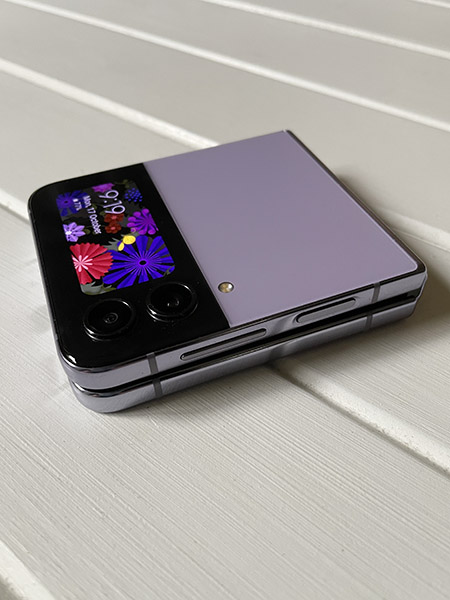
Samsung’s 3700mAh battery for the Galaxy Z Flip4 is pretty small when compared to other devices on the market, although it is an increase on the Z Flip3, and the same battery capacity as the flagship Samsung Galaxy S22 — and it’s also bigger than the battery of some of the new iPhone 14 devices.
However, I was fairly disappointed in the battery performance overall. While it was able to get through a typical day of usage fairly well, I felt it drained battery faster during certain activities. Over the space of 8 hours and 30 minutes of moderate usage (web and social media browsing and streaming HD video with regular idle periods), it drained around 27% of the battery. A 12 hour and 30 minute day of slightly lighter usage (mostly social media and web browsing with regular idle periods) drained 34% of the battery. I was able to stretch out two days of moderate usage (with regular idle periods) on the one full charge, but heavier users will find this a challenge.
Measuring my battery usage with certain activities, I found that 30 minutes of HD Disney+ video streaming drained 4% of the battery, while around 30 minutes of gaming drained 7% of battery. When comparing to other devices I’ve reviewed in recent months — such as the OPPO Reno8 Lite 5G with a 4500mAh battery — the battery drain is fairly consistent with what you get with other devices, although the Flip4 uses around 1% more battery for a comparable activity and time frame. This might seem insignificant, but for a heavier user who regularly plays games, it might be more noticeable, so it’s worth keeping an eye on.
The good news though is that you’ll get fast charge compatibility, with up to 25W of wired fast charging and 15W of wireless fast charging. Using a 15W fast charger (wired), I could get from 0% to 100% battery in 1 hour and 48 minutes, while using the full 25W fast charging shaved that 0% to 100% charge to 1 hour and 16 minutes. Once you’re used to faster charging, a standard charge plug is painfully slow, where I didn’t even reach 50% battery with 3 hours of charging.
The Samsung Galaxy Z Flip4 does, overall, have a good performance. For the price point, you expect it to feel and behave like a premium device and that’s what you do get. However, it was not a perfect experience (and no smartphone is ever going to be completely flaw-free). But these minor issues, such as faster battery drain, didn’t detract from the experience of using the Galaxy Z Flip4 day-to-day.
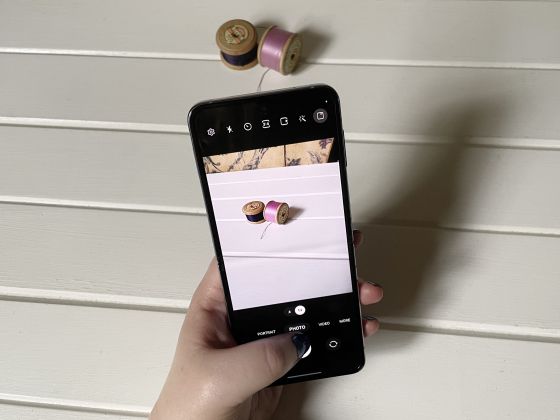
Cameras
- True to life and vivid colours
- Nice and natural depth on standard photos but portrait mode blur a little more artificial
Despite only having two rear cameras (compared to the triple-rear camera setup on the Galaxy Z Fold4 and Galaxy S22), the Flip4 delivers the quality camera performance that you expect of a premium Samsung device.
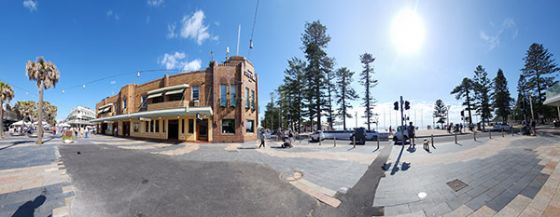
Samsung promotes the Z Flip4’s foldable ability as a feature to expand your photo-taking creativity. There’s the obvious that you can take hands-free photos as long as you have a stable object to place the phone on. But I did find that being able to fold the phone meant that I was able to take photos at certain angles that would typically be hard to do with a standard phone, such as getting low and flat on a surface. It does give you the freedom to change the angle of the shot without needing to adjust your hand’s position. If you love taking photos on your phone of a variety of different subject matters, you’ll enjoy the flexibility and creativity that taking photos with the Galaxy Z Flip4 gives you.
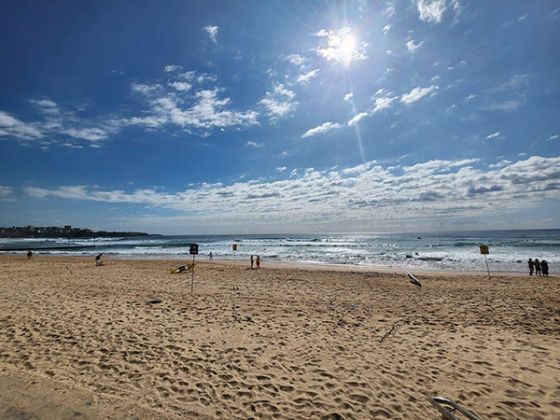
You also have the option to take photos and videos with the phone closed by double clicking the lock button to open the camera and tapping the screen for a countdown to take the photo automatically. It uses the mini display as a preview and you can take standard photos, portrait mode selfies and videos. It’s a really handy feature and although you might not see the full subject matter in the preview, it still takes a full shot.
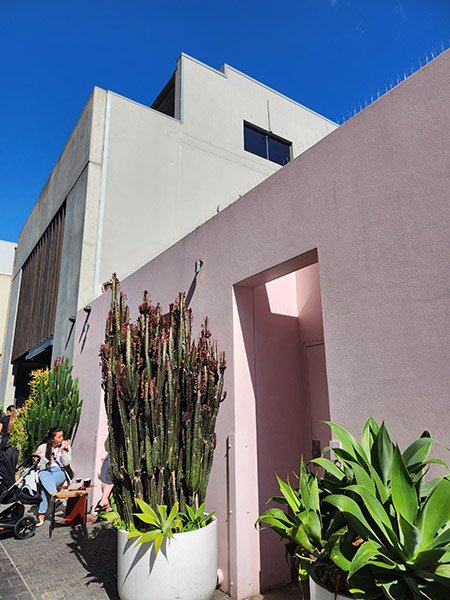
One thing that struck me was how vivid the colours were, especially in settings with a lot of brightness like a very sunny day. That being said, the colours don’t look unnatural or overly saturated, just very vivid. When the lighting is reduced, the colours and overall tone still looks natural.
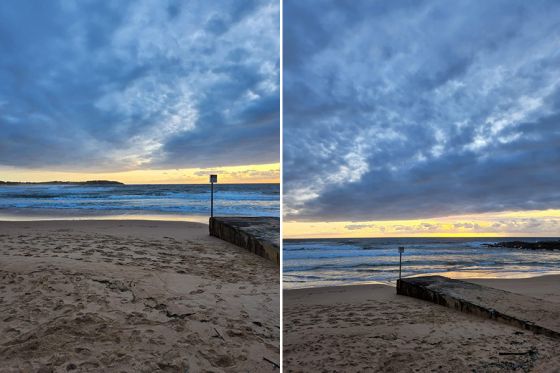
Outdoor photography is stunning, and this is where it’s particularly noticeable on a bright, sunny day. While taking photos in bright lighting does produce some pretty spectacular results, you also notice the vivid colours in lower light settings. Taking photos at sunrise on a rather overcast day, I was impressed with how bright the sunrise colours appeared. However you do notice that Samsung tends to bring out the blue tones in photos more, compared to iPhones which are typically warmer.
The Flip4’s ability to make colour pop is also a big advantage when taking photos indoors. There was a very true-to-life colour and vibrancy to the photos — and not overly saturated — that is often lacking in lower light conditions with other phones. You can expect your indoor shots to look just as good as your outdoor ones, and it’s also very intuitive with kicking into night mode when the lighting is poor.
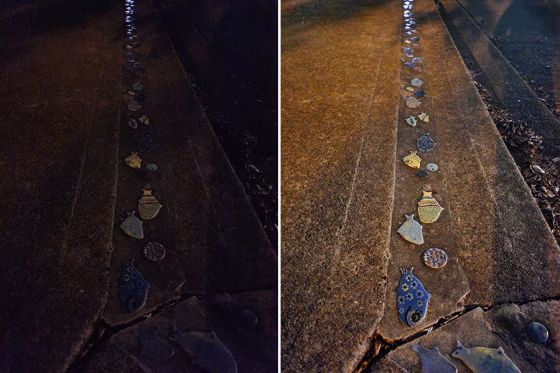
As for night mode (called ‘night shot’), Samsung really smashes it out of the park, and you would certainly hope so for the price. The cameras are good enough to handle low light/night settings with minimal noise even without night shot switched on. When you do use night shot, you get a great burst of brightness, which is clearer once the image has processed.
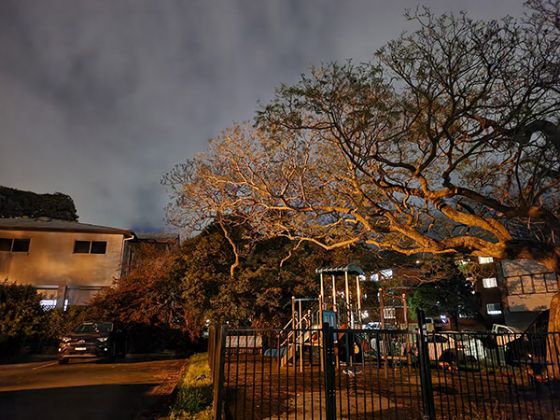
Taking photos one night when it was very cloudy without night shot on, you don’t see much depth in the sky, but with night shot on, you see more details in the clouds. The results are crisp and clear, and it’s pretty hard to get a bad night time photo when giving it a boost with night shot. Even using night shot in conditions with virtually no light, you do get minimal noise and it does an excellent job at showing the details compared to seeing virtually nothing in the standard mode. It’s also great when taking photos in low light settings, like indoors, if you want a subtle lift to the brightness of your shots.
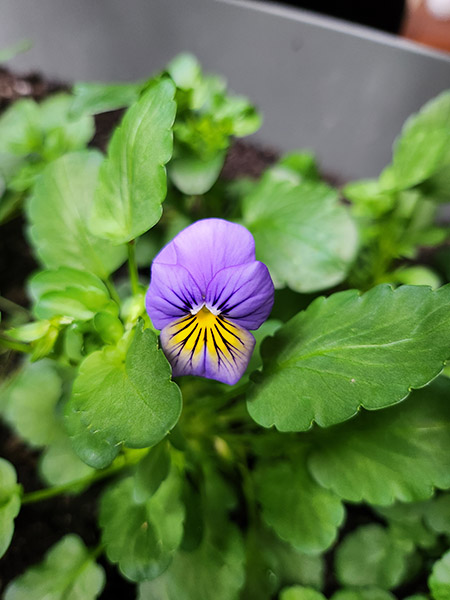
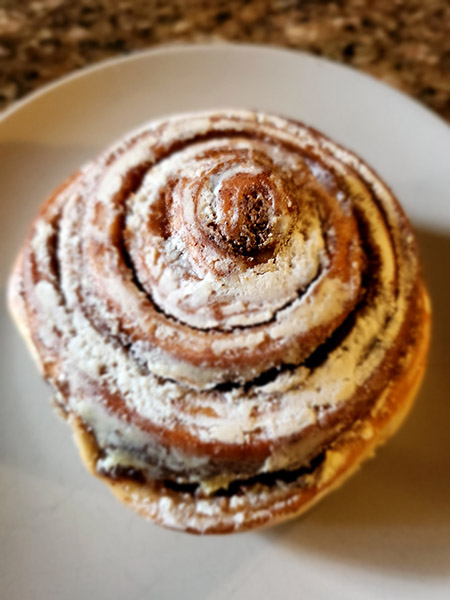
A macro mode is most notably missing from the Galaxy Z Flip4 — it’s a feature that Samsung only really supports with its cheaper A series phones (it’s also unavailable on the S series). However, the Flip4 is more than capable of picking up on some close-up detail, and unlike the macro mode on cheaper phones, the quality is pretty crisp when you zoom in. Even when taking close-up shots in low-light settings, the quality is still rather clear with minimal noise — something cheaper phones with macro mode typically struggle with. Foodies will also find the food mode useful for picking up detail and adding blur to your food pics.
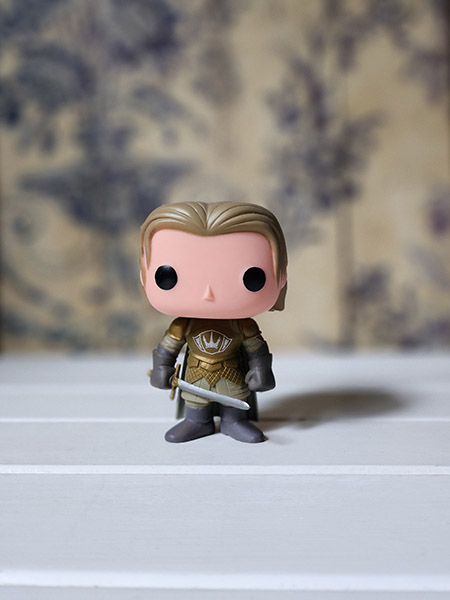
While I was really happy with the cameras in general, I was rather disappointed in its portrait mode. That’s not to say that its portrait shots aren’t nice, but for a premium phone, I expect a much more natural looking blur. Instead, the Galaxy Z Flip4 generates the same artificial blur that other devices – specifically cheaper phones – suffer from. I didn’t have the issue with every portrait mode shot I took, but it did struggle to capture and maintain the focus in closer proximity, and I found in some instances that it blurred the edges of the subject matter too much, particularly around the hair. It wasn’t terrible, but considering the price point, I was a little let down.
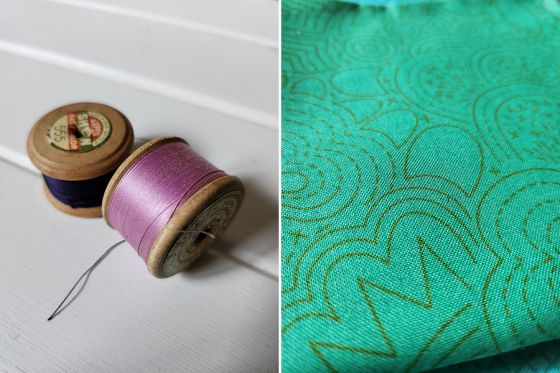
Video quality is fairly decent and the Flip4 does a good job at autofocusing and producing a nice blurred background when focused on a close subject. However using zoom while recording video is a bit glitchy when you switch from standard camera view, and zoom out to the wide-angle camera. You can see an obvious jump when it switches lenses and there’s also a bit of noise distortion when this happens. It’s more obvious when you’re recording, but it’s still visible on playback.
Considering Samsung’s reputation for producing some of the best camera setups on the market, I did have high expectations. The Galaxy Z Flip4 did match most of my expectations, but portrait mode does have some room to improve. Ultimately you’ll have a great experience and be able to produce some great photos – you just might need several tries to get your portrait shots right.
Note: Images taken on the Samsung Galaxy Z Flip4 have been digitally compressed for web.
Should I buy the Samsung Galaxy Z Flip4?
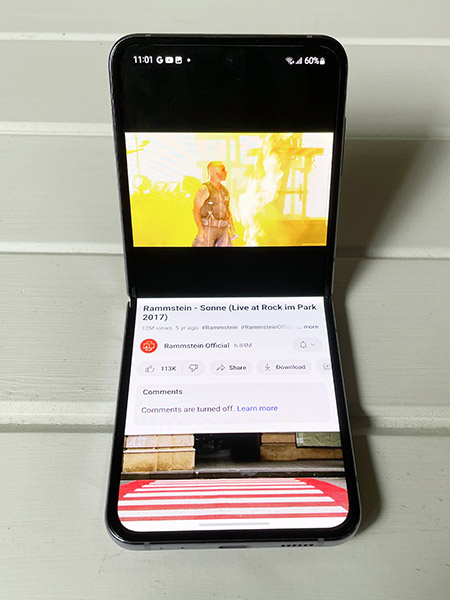
Obviously the main question isn’t whether you should buy this particular phone for what’s under the hood, but whether you need a phone that flips into a more compact size.
It’s pretty hard to go wrong with a premium Samsung phone at this point – it’s one of the biggest phone manufacturers for a reason. The features and specs you get with the Z Flip4 are definitely top quality and give you a fantastic overall experience.
If this is the first time you’re considering a flip phone (and not just for the gimmick of it being a foldable phone), it’s worth considering whether a smaller — although thicker — device will make a huge difference when carrying the phone in your bag or pocket. I can see the advantage of it being able to fit into spaces a standard phone won’t, but you do then have the double thickness to contend with. While many phones are rather large, it is still possible to pick up smaller sized devices that might be compact enough without the extra thickness.
However, if you’re set on getting one of Samsung’s flip phones, you might want to weigh up whether the Z Flip4 has enough upgrades compared to the Z Flip3, or whether it’s worth saving a little bit of money and tracking down the 2021 foldable phone instead. Considering I found the battery was a little bit of a letdown with the Z Flip4, and it’s still a bigger battery than its predecessor, the battery life alone might be reason enough to buy the 2022 model. Otherwise, it’s worth weighing up what you really want from the device to work out which phone will be best for you.
It’s also worth considering whether the Galaxy Z Flip4 carries enough premium features to justify the price tag. Prices for the Samsung Galaxy S22 start at $1299, and it has some more impressive specs under the hood. It’s also a rather compact size compared to many other phones on the market, with a 6.1-inch display.
Ultimately, you won’t be let down by what you get with the Galaxy Z Flip4 – just make sure you’re getting the phone because it suits what you need, and not just for the gimmick of a foldable phone.
| Consider the Samsung Galaxy Z Flip4 if | Don’t consider the Samsung Galaxy Z Flip4 if |
|---|---|
| You’re after a compact flip phone with better battery than its predecessor. | You’re not desperately in need of a phone that folds. |
Product used for review/testing was a free sample provided by Samsung.
About the reviewer of this page
 This report was reviewed by Canstar’s Editor, Bruce Pitchers. Bruce began his career writing about pop culture, and spent a decade in sports journalism. More recently, he’s applied his editing and writing skills to the world of finance and property. Prior to Canstar, he worked as a freelancer, including for The Australian Financial Review, the NZ Financial Markets Authority, and for real estate companies on both sides of the Tasman.
This report was reviewed by Canstar’s Editor, Bruce Pitchers. Bruce began his career writing about pop culture, and spent a decade in sports journalism. More recently, he’s applied his editing and writing skills to the world of finance and property. Prior to Canstar, he worked as a freelancer, including for The Australian Financial Review, the NZ Financial Markets Authority, and for real estate companies on both sides of the Tasman.
You can like us on Facebook and get social, or sign up to receive more news like this straight to your inbox. By subscribing you agree to the Canstar Privacy PolicyEnjoy reading this article?


Share this article